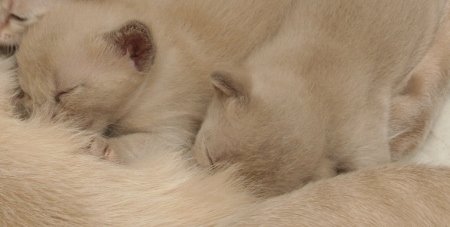For the first three weeks after the birth provide the queen with a clean, quiet and warm environment for her to begin the job of raising her family. She will need an increase in good quality food in order to produce enough milk for her babies. Food and fresh water should be available round the clock.
Take notice of the contents of her litter tray, as this is a good indicator of her health. The tray should be a reasonable distance from her bed and you may need to let her use a tray elsewhere in the house if she prefers that. Some queens become constipated after birthing and some get diarrhoea from cleaning up their babies. So be prepared to treat either condition appropriately but be sure to consult your Vet if problems persist or if the queen becomes listless.
If you allow the queen to leave her room she may try to move the kittens around the house. It can be quite a shock to see the queen with a kitten hanging from her mouth! The most important thing is not to allow her to find somewhere which is completely inaccessible as you don’t want to have to start knocking down the house. All you normally need to do is to return the queen and her kitten (or kittens) to her room and confine her until she settles down again.

The kittens are usually totally dependent on their mother for this period. However, you can help her by keeping a close eye on them and, in particular, by checking their cords to make sure there is no sign of infection. Usually within the first week, they shrivel and fall off. Likewise, when their eyes start to open, at around 5-9 days, you should bathe any discharge with a warm, mild saline solution or cold tea. Once started, the eyes should be fully open in 3 days. If an eye opens and then closes again it can be a sign of infection and will need eye ointment or antibiotics from your Vet. Other than this you just need to make sure all the kittens are getting regular feeds from mum and are gaining weight steadily, at a rate of about 0.5oz (15g) per day.
Kittens are feeding every couple of hours at this age so if you find one with a flat belly or a cold mouth it has probably missed a meal and will benefit from a supplement given either by a syringe or a bottle feeder for kittens. You can use a proprietary milk powder made up to the manufacturer’s directions or evaporated milk (diluted 4 parts milk to 1 part water) but if using evaporated milk, it’s best to choose a well known brand as shop’s own brands are sometimes not so nutritious. As with any baby, all equipment used should be sterile.
Next comes Weeks 3 to 7.
